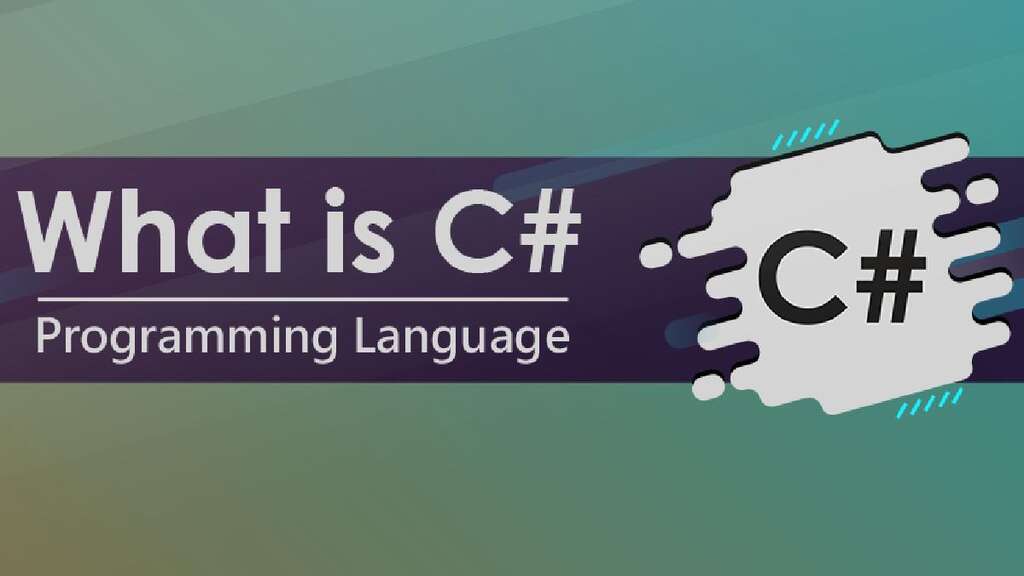If you’re thinking about which programming language to use, you’ve probably come across C#. But what is C# used for and why should you care?
C# developed by Microsoft is a general-purpose programming language. It is an object-oriented programming language that is part of the .NET framework. This makes it very relevant for organizations that need a reliable, scalable, and secure language for a wide range of software development services.

Keys to use
Let’s dive right into the key applications of C#.
Web applications development
- First on the list is web application development. C# is the core language of ASP.NET, a framework designed specifically for creating dynamic and robust web applications.
- We’re not talking about basic websites. ASP.NET allows you to create complex, data-driven web applications that can scale to meet the demands of large user bases.
- Whether you’re building an e-commerce platform, a social media site, or an internal business application, C# provides you with the necessary tools and libraries.
Game development
- Later, C# has carved out an important role in the world of game development.
- This is largely due to its seamless integration with Unity, one of the industry’s leading game development engines. Unity’s capabilities are not limited to any specific type of game, meaning you can use C# to develop anything from a mobile puzzle game to a high-definition console game.
- The language’s object-oriented programming features make it easy to manage complex game architectures, providing both flexibility and control.
Desktop and mobile applications
- But the usefulness of C# does not end there. The language is also a solid choice for creating both desktop and mobile applications.
- For desktop applications, Windows Presentation Foundation (WPF) offers a rich set of features to create visually appealing and interactive user interfaces. On mobile, Xamarin lets you use C# to create apps that run smoothly on Android, iOS, and Windows.
- This cross-platform capability means you can target multiple operating systems without having to learn a new language for each one.
Cloud computing and IoT solutions
- Finally, let’s not overlook the growing presence of C# in cloud computing and the Internet of Things (IoT).
- The compatibility of this language with the .NET platform makes it ideal for developing cloud-based applications and services.
- Whether you want to build a scalable web service or manage IoT devices, C# offers libraries and frameworks that simplify these complex tasks.
Benefits: Why choose C#?
Understanding the benefits of C# can provide valuable information to decision-makers. Here’s a more detailed, yet concise, look at why C# might be the right choice for your projects.
Static typing: Early error detection
One of the most notable features of C# is static typing. This feature allows you to detect errors during the development phase instead of after the application is live. It’s a proactive approach that saves time and resources, making your development process more efficient.
Class libraries: Streamline your development
C# includes a large number of class libraries. These are essentially building blocks of pre-written code that your developers can use. This speeds up the development process and allows you to bring your app to market faster.
Integration with Microsoft Visual Studio:
All-in-one development environment. C# integrates seamlessly with Microsoft Visual Studio, an industry-leading IDE for software development. This integration provides a unified environment for your development needs, making the process more agile and efficient.
Community Support: A wealth of resources
C# has enormous community support, which is a significant advantage. If your team runs into a problem, there is a good chance that solutions or workarounds are readily available. This community-driven support can be very valuable in resolving issues in a timely manner.
Current Status: What’s new in C#?
Microsoft updates C# frequently to introduce new features and functionality. This constant evolution keeps C# at the forefront of the most popular programming languages. Below are some key points that highlight the continued advances in C#:
Features and functionalities
- Pattern Matching – This feature allows for more expressive and concise code, making it easier to work with complex data types.
- Records – Introduced to simplify the creation of immutable types, records are a game-changer for custom software development companies that prioritize immutability in their applications.
- Nullable Reference Types – This feature helps developers avoid null reference exceptions, a common mistake in C# programming.
- Asynchronous streams – This makes it easier to work with real-time data and improves the performance of applications that rely on data streams.
Integration with the .NET platform
C# is tightly integrated with the .NET platform, which is updated regularly. The latest versions of .NET offer improved performance, new libraries, and better cloud integration. This makes C# a solid choice for any organization looking to invest in a robust, scalable, and well-supported programming language.
Community Contributions
One of the strengths of C# lies in its enormous support from the community. The community often contributes to the development of the language, offering libraries and frameworks that enrich the C# ecosystem.
Industry adoption
C# is not only popular but also widely adopted in various industries. From web application development to game development and from cloud computing to IoT solutions, C# is a versatile and reliable choice.
Risks and challenges: What to consider
When adopting any programming language, it is important to weigh the pros and cons. C# is a popular programming language with a lot to offer, but it also has its own set of challenges that decision-makers need to consider.
Learning curve
One of the first things to keep in mind is the learning curve. Although C# is an object-oriented language that many find intuitive, it can be more challenging for beginners compared to other languages such as Visual Basic. This could mean a longer onboarding process for new developers, which could slow down the initial stages of development.
Performance optimization
Another concern is performance. C# is a powerful language, but if not optimized correctly, it can result in slower application speeds. This is particularly important for real-time applications, where milliseconds matter.
Compatibility and integration
C# is very versatile and integrates well with various databases and front-end technologies, making it a good choice if you already use Microsoft technologies or the .NET platform. However, if your technology stack is built on other platforms, integrating C# could require more time and resources.
Cost
Although C# itself is free to use, the software development services environment, particularly Microsoft Visual Studio, may require paid licenses. Additionally, since C# is one of the most popular programming languages, the demand for skilled developers can increase labor costs.
Community support
Although C# has enormous community support, it’s worth noting that some niche applications may not have as many resources or solutions readily available as more commonly used technologies. This might mean relying more on internal problem-solving.
Despite these challenges, it is important to note that C# remains a solid choice for a wide variety of software development projects. Its versatility, robustness, and the support of a large community and Microsoft make it a language that can offer more advantages than disadvantages, especially for projects that require scalability, security, and performance.
Sufficiency: Is C# suitable for your project?
The suitability of C# depends on the specific needs of your project. For example, if you are dealing with web services or cloud-based solutions, C# is often the preferred choice. It’s essential to evaluate your project requirements and see how they align with C# capabilities.
Collaboration opportunities with external developers
C# occupies a position as one of the most popular programming languages, creating a favorable landscape for organizations considering external development resources.
C#’s extensive pool of third-party developers offers a wealth of contract and project work options,
presenting a valuable opportunity for organizations to leverage specialized expertise as needed.
Positive aspects to take into account:
- Cost Flexibility :
The deep talent pool for C# allows organizations to find developers to fit various budget constraints. Whether you’re looking for emerging talent or seasoned experts, there’s likely a cost-effective option for your needs.
- Diverse Skill Sets :
Since C# is used in a variety of fields, from web application development to game development, you have the opportunity to find developers with the exact skill set that matches your project requirements.
- Immediate availability :
The popularity of C# means that there are a large number of developers available for hire. This can streamline the hiring process, allowing you to get started on your project sooner.
- Ease of project alignment :
Given the structured and well-documented nature of C#, bringing in third-party developers can be a simple process. This helps quickly align them with your project goals.
- Cultural synergy :
The large community around C# often shares best practices and values continuous learning, making it easy to find third-party developers who fit well with your organization’s culture and communication style.
Security and Compliance
C# offers robust security features, but like any language, the security of your application ultimately depends on best practices during the development process. Therefore, it is important to consider how C# aligns with your organization’s compliance requirements.
Long term aspects
C# offers several advantages for long-term maintenance, primarily due to its object-oriented programming structure. This allows for modular code, which simplifies updates and changes. Additionally, C# benefits from tremendous community support and regular updates from Microsoft as part of the .NET framework. These factors help make long-term maintenance easier and more cost-effective.
However, there are also considerations:
- Project complexity: A more complex project will require more specialized knowledge for long-term maintenance.
- Choice of frameworks: Choice of frameworks can influence long-term maintainability.
- Costs: Although C# is free, some associated tools and frameworks have costs that can add up.
Alternatives to C#
When considering C# for your next project, it’s important to weigh it against other programming languages that might also meet your needs.
Here are some alternatives:
Java
- General-purpose object-oriented language: Similar to C#, Java is also a general-purpose programming language.
- Community Support – Java has a large and active community, comparable to that of C#.
- Cross-platform: Unlike C#, which is strong on the .NET platform, Java offers broader cross-platform support.
- Web Application Development – Java is commonly used to create enterprise web applications.
Python
- Ease of use: Python is famous for its simple syntax, which makes it easy to learn.
- Versatility: This language is used in various applications, from web services to data analysis and artificial intelligence.
- Rapid development: Python is designed for agile development and offers several frameworks that speed up the process.
- Community and libraries: Although different from the .NET framework on which C# is based, Python has an ecosystem of libraries and an active community.
Ruby
- Developer Ease – Ruby is designed to be easy to read and write, prioritizing the developer experience.
- Web development: Thanks to Ruby on Rails, a very popular framework, Ruby is a solid choice for web application development.
- Community: Although smaller than the C# or Java communities, the Ruby community is committed.
- Flexibility: Ruby allows for greater flexibility in the code, which could be an advantage or a disadvantage, depending on the needs of your project. The best choice will depend on several factors, such as your project requirements, the experience of your custom software development company, and your long-term technology strategy. Therefore, understanding the nuances of these programming languages can provide valuable information for decision-makers.
Conclusion: Make an informed decision
C# is a versatile and reliable programming language that offers a wide range of applications for modern businesses.
From web application development to game development, and from cloud computing to IoT solutions, C# is a strong contender for any organization looking to invest in a robust, scalable, and well-supported programming language.






